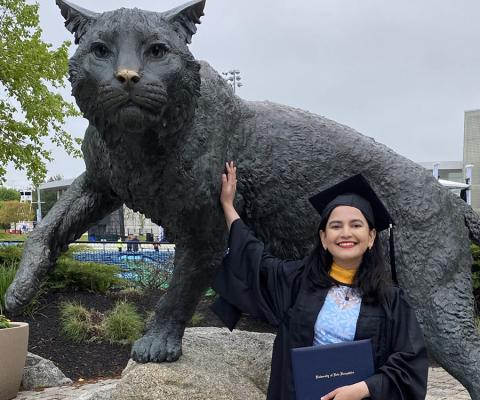
Alumni Spotlight Q & A:
Where are you from, Aditi?
I was born in Odisha and grew up in West Bengal, India.
What was your major at UNH and who were your advisers?
I earned my Master of Science in Ocean Engineering with Dr. Jen Miksis-Olds and Dr. Tony Lyons as my advisers. My research was in Underwater Acoustics and focused on the impact of hurricane-induced sound on marine soundscapes and on acoustic detection of cetaceans.
Why did you choose UNH?
I chose UNH based on a recommendation from a mentor who worked closely with several acousticians at UNH’s Center for Coastal and Ocean Mapping (CCOM). Being at the crossroads of the biological and engineering sides of acoustics for many years, I was eager to find the right balance and plant myself determinedly in the middle to specialize in marine bioacoustics.
What were your favorite courses and which professors had the greatest impact on you?
It’s hard to pick just one – both for courses and professors! Tom Weber’s Underwater Acoustics and Tom Lippmann’s Intro to Time Series Analysis courses were nothing short of inspiring. Though they were fast paced and there was a lot of information to learn, I enjoyed every minute of it and found that it solidified my interest in the field of Underwater Acoustics and Oceanography. However, the best advice I received from them wasn’t related to classes at all. Tom Weber advised me to spend some time everyday reading for fun, not just for research. Tom Lippmann, who was one of my committee members as well, made sure I always knew that I belonged as much as anyone else and that my hard work is appreciated.
What was student life like and were you involved in any extracurricular activities?
Student life was very fun! I made an effort to have focused, dedicated time towards research during typical work hours and prioritize friends and self-care afterwards. Even though I wasn’t a particularly outdoorsy person, being at UNH and surrounding areas really made me fall in love with being out in nature, camping, and going on walks/runs on trails. My friends at CCOM were also really enthusiastic to participate in GSS activities like Thirsty Thursday, ice skating, coffee hours, etc., but also have our own fun plans outside of GSS like cooking together, having wine and cheese nights, and movie nights. I really enjoyed going to the HRC as well – it was so nice to just work out while listening to a podcast after a busy day of coding!

What was the biggest transitional issue you faced when you started at UNH?
The pandemic started a few months after I started my graduate program and it was definitely a big transition for me, and for everyone else in general, of course. At the time, I was really grateful for the support from my friends, family, and professors. Definitely happy that I was able to defend and celebrate the end of my Master’s in person!
What is your current position and why is your work important?
I am an Acoustic Engineer at Tetra Tech (Tt) in Boston, Massachusetts. I am a part of the Noise Team at Tt and specialize in underwater acoustics and more recently, in-air acoustics. I contribute to a wide range of projects both underwater and in-air, but primarily perform acoustic modeling to estimate distances to thresholds of injury and behavioral disruption in marine mammals due to offshore construction. My work is important because we assess and help limit the potential for permanent and/or temporary impact on marine mammals due to exposure to anthropogenic sound sources such as from pile driving during offshore wind farm construction.
When I was interviewing for jobs I recognized that not everyone gets to work in what they went to university for, so I feel very lucky that I get to apply a big portion of what I specialized in and learn new things at the same time to keep building on my knowledge in underwater acoustics. Every work day brings different tasks and challenges so it is always exciting and interesting. Above everything, I am grateful to be part of a very supportive team of talented acousticians which makes the entire experience very rewarding.
"When I was interviewing for jobs I recognized that not everyone gets to work in what they went to university for, so I feel very lucky that I get to apply a big portion of what I specialized in and learn new things at the same time to keep building on my knowledge in underwater acoustics."
What are your future career plans?
I hope to become an expert in underwater acoustics and continue to make meaningful contributions towards understanding short-term and long-term impacts of ambient sound changes on marine mammals.
Any advice for undergrads/grad students who are conducting research?
It’s important to spend a significant amount of time understanding why you are doing something than to just spend a lot of time doing that something! What I also found really useful was doing some organization at the start and end of each week, having many checklists with tangible tasks that I can check off to track my progress, and writing my thesis early on. And try not to stress so much or worrying about a linear path towards your goal – things usually end up working out one way or another and you’re doing your best!
Are you on social media and do you have any other links to share?
- My Master’s thesis, The Impact of Hurricanes on the Acoustic Detection of Cetaceans
- My most recent project, Coastal Virginia Offshore Wind | Bureau of Ocean Energy Management (boem.gov)
- You can find me on LinkedIn
PURSUE A DEGREE IN OCEAN ENGINEERING
Are you or is someone you know an alum who conducted research with us? Do YOU want to be featured in an upcoming Alumni Spotlight? We'd love to connect! Please email Rebecca.Irelan@unh.edu with details.